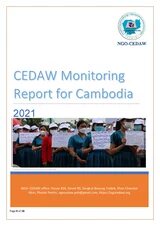CEDAW Monitoring Report 2021
Overshadowing most events of 2021 was the emergence of COVID-19 transmission within the community, leading to new restrictions including curfews and lockdowns, a strain on hospitals, and deaths which disproportionately affected unvaccinated pregnant women. Existing restrictions including limitations on travel, and closures of many schools and businesses continued to have harmful emotional, educational, and economic effects on Cambodian girls and women. Government funding to local authorities was increased to help anti-COVID-19 measures, but was also diverted away from direct services for women’s health and gender-based violence. Many positive efforts by the government such as efforts to adopt a National Policy on Gender Equality were paused, although some progress was made towards implementing the existing National Action Plan to Prevent Violence against Women (NAPVAW III) and crafting policies to teach local authorities to avoid misusing alternative dispute resolution in domestic violence cases. It has been helpful that in late 2021 additional funding was announced by UN Women and the Australian Embassy for implementing NAPVAW III and for other gender mainstreaming work. However, this does not address the chief concern of civil society that without dedicated, long-term funding from the national budget, gender is not truly being prioritized. Additionally, many fundamental freedoms for women remained unprotected. The year ended with crackdowns on peaceful women-led strikes against NagaWorld, which in 2021 laid off many of its workers, disproportionately affecting pregnant and nursing women and women unionists. This report is a summary of key concerns and events which occurred in the calendar year 2021. It does not attempt to comprehensively address all issues facing women, girls, and nonbinary persons living in Cambodia, but rather focuses on those which were new or of particular concern in 2021. Some updates may have occurred in 2022, but those also are beyond the scope of this report.
